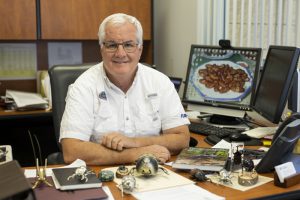
We honor our leader, Dr. Ronald D. Cave, for eight years of IRREC leadership, and 22 years of service to agricultural and natural resources
For his leadership to inspire a team of scientists who publish in the most prestigious journals and for his ability to select six high-performing scientists and then provide them with cutting-edge equipment are some of the reasons why Ronald D. Cave’s team’s members regale him as he retires from a 22-year career with the University of Florida.
Cave is the Director of the University of Florida Institute of Food and Agricultural Science’s Indian River Research and Education Center (IRREC). The center is integral to UF’s statewide commitment to serve Florida’s agriculture and natural resources industries. One of 12 research facilities, each is positioned in Florida’s food production corridors.
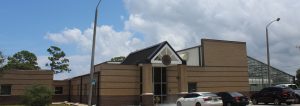
Early leadership at the UF/IFAS Norman C. Hayslip Biological Control Research and Containment Laboratory
Cave joined the IRREC faculty in 2002 as an assistant professor of entomology. He was one of two of the original scientists who oversaw the construction and completion of the center’s Norman C. Hayslip Biological Control Research and Containment Laboratory. Two approved species have been released from the Hayslip lab that now control the area’s most invasive plants.
Over the past 20 years, Cave rose to increasing levels of responsibility. Cave earned promotions to associate professor and then to full professor. In 2016, Cave was promoted a third time to lead IRREC and its 75 employees as its sixth director.
The IRREC lies in the heart of the world’s premier grapefruit production region. Researchers at the site are involved with entomology, biological control of invasive species, citrus production, postharvest physiology, plant pathology, plant root biology, soil and water science, and aquaculture. There, 10 faculty research scientists and their teams, which include postdoctoral researchers, graduate students and visiting scientists, strive to protect crops at the intersection of horticulture production and environmental protection.
Distinguished science writer and publisher
Cave’s team members concur that their supervisor elevated the center’s capabilities with his talents as a publisher and as an editor. Under his leadership, Cave selected six new faculty members who are well prepared to face the most challenging plant production problems of the 21st century, including emerging diseases and changing climate conditions, the increasing number of invasive species, and complications around water resources.
“Dr. Cave emphasizes the importance of publishing continually and helping junior faculty members to identify and meet the standards of the most prominent scientific journals in our specific disciplines,” said Zhenli He, associate center director and professor of soil, water, and ecosystem science. “Dr. Cave motivated us to perform at our highest level.”
Heightened IRREC faculty publications
Since 2016, the number of publications attributed to IRREC scientists increased steadily. Google Scholar indexes climbed to a level that outcompeted IFAS departments throughout the entire state. In 2022, IRREC faculty members produced 57 refereed journal articles, that is, published out, or work that the scientists’ peers evaluated. And although many IFAS departments had higher numbers of publications, Cave’s department’s number of publications per research full-time employee was number one in 2022, as it was in 2021.
“More impressive is the publications per research full-time employee: 8.8 in 2019, 11.5 in 2020, 13.2 in 2021, 13.0 in 2022,” Cave said.
Cave counts a total of 61 publications for 2023, four more than for 2022, but comparative results for all the IFAS departments are not yet available.
“We hope to maintain the same standards as the previous years,” Cave wrote in an opening piece in a recent IRREC Newsletter.
As with himself, Cave is known to “push” his faculty members to reach new findings and advance science at the global level through distinguished journals.
World-leading scarab beetles expert
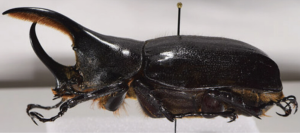
International recognition for publications
Along with a colleague, Brett Ratcliffe, Cave published a series of volumes about dynastine scarab beetles in the Western Hemisphere. The two beetle experts garnered international recognition from the Royal Entomological Society in the United Kingdom for their work together. In 2021, society leaders presented Cave and Ratcliffe with the J.O. Westwood Award, a coveted international recognition specific to the taxonomy or meticulous inventorying of insect faunas.

“Dr. Cave and I have published a series of monographs that cover all the rhinoceros beetle species in North and Central America and the West Indies. We continue to publish our biodiversity surveys about this large group of beetles in South America,” said Brett Ratcliffe, entomology professor emeritus at the University of Nebraska-Lincoln.
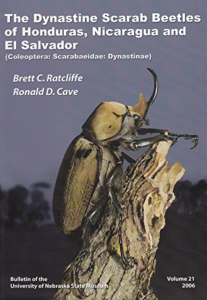
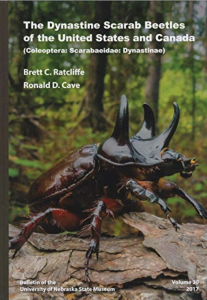

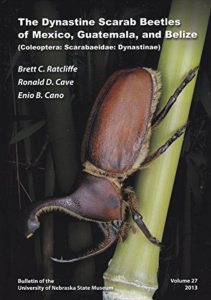
Ratcliffe completed one volume alone, and six with Cave, of faunal surveys and taxonomy of New World rhinoceros beetles, including discovering species new to science. Many species are little-known, and their collaborative work provides original research of scientific excellence on the classification description, distribution, and natural history of these beetles, Ratcliffe said.
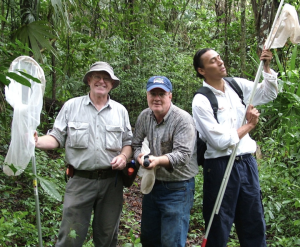
Continuing work on monograph series
Since the Royal Entomological Society’s award selection was announced for Cave and Ratcliffe’s work, a sixth monograph was published in 2020 on the dynastine scarab beetles of Ecuador, which was supported by funding from the National Geographic Society, and a seventh was published in 2023 on dynastine scarab beetles of Argentina, Paraguay, and Uruguay. Cave and Ratcliffe produced a journal article that covers the fauna of Chile.
Liliana Cano said her supervisor understands that science evolves constantly, and new equipment can enhance the quality of scientific discovery.
Faculty research priorities
Cano raves about Cave’s values as a scientific leader who can identify the most talented new faculty members who address the industries they serve with what Cave refers to as “hard-hitting science.” Cano celebrates Cave’s initiation and implementation of the “Gene Expression Room” that she and other scientists use for transcriptomics. Transcriptomics broadly refers to the study of RNA related to its expression levels and enables a holistic disease view, leading to more accurate detection of pathogens.
“Due to an increase of new IRREC scientists, Dr. Cave realized the need for new scientific tools,” Cano said. “Dr. Cave provided a high-end machine used to study pathogens and insect pests. He added new microscopes to both the plant science and the biological control lab to analyze large groups of samples and separate those most useful. The new microscopes use fluorescence to separate the samples. It was a huge support for the new faculty members.”
Supporting faculty members is central to Cave’s management style and vision to keep IRREC research professors on the competitive edge. Mark Ritenour, an IRREC horticulture professor with expertise in postharvest technology, noted Cave’s ability to maintain communications and collaborative projects among his team members during one of the most challenging eras in the early 21st century.
Communications during global pandemic
“Dr. Cave was successful in leading the center through the COVID-19 pandemic by maintaining good communication through a tremendous upheaval,” Ritenour said.
Lorenzo Rossi joins his colleagues in praise for Cave’s faculty leadership and support. Rossi is an assistant professor of plant root biology, part of the UF/IFAS Horticulture Department. Rossi points to Cave’s efforts to advance online education, innovations for alternative crop development and an exceedingly high number of award nominations.
Fostered a “culture of excellence”
“Dr. Cave’s multifaceted contributions have left an indelible mark on my program. His efforts have not only advanced my academic and research capabilities but also fostered a culture of excellence and recognition in my laboratory,” said Rossi.

Exceeding number of successful award nominations
In his time as director, Cave’s nomination packages for 13 faculty members, a postdoctoral research associate and staff members have enjoyed success and recognition at elegant ceremonies in Gainesville, Florida, at the main UF campus. Rossi said Cave strategized and wrote letters of support for 10 additional awards for most of the IRREC laboratories. His dedication and meticulous effort in crafting recommendation letters significantly contributed to the recognition of faculty and students.
“Thanks to his support, I was honored with an Early Career Award from the American Society for Horticultural Science and a UF/IFAS Superior Accomplishment Award,” said Rossi. “Several students from my lab received recognition due to the compelling letters of recommendation Dr. Cave wrote on their behalf.”
Alternative crops and the Millennium Block
Cave leads his research faculty members to explore alternative crops. The Millennium Block, a citrus grove that features more than 5,500 new trees expected to tolerate the most serious citrus disease worldwide, was implemented in 2019. Other crops IRREC faculty researchers have explored or are currently working with include passion fruit, coffee, olives, eucalyptus and pongamia,
Work following retirement
Although Ronald D. Cave is on track to retire in August, he plans to continue into retirement with his work to document and publish books about South American rhinoceros beetles with Ratcliffe, and South American colleagues.
Currently, the two entomologists are at work on two more volumes for the dynastine scarab beetle faunas in Peru (expected release in 2025) and Bolivia (expected release 2027).
“Retirement simply means more time to devote to continuing this scientific series,” said Ratcliffe.
Cave is also involved in projects to survey the natural enemies of the cycad aulacaspis scale in Guam, Northern Mariana Islands, and southern Japan, with the ultimate goal of possibly introducing new biocontrol agents into these areas to protect native cycad forests.
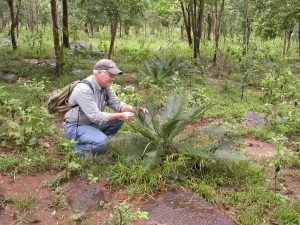
 22
22
